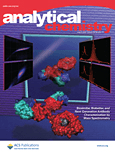
ANALYTICAL CHEMISTRY
Scope & Guideline
Driving Excellence in Analytical Research
Introduction
Aims and Scopes
- Method Development and Optimization:
Focuses on creating, refining, and validating new analytical methods and protocols for the detection and quantification of various compounds across different matrices. - Advanced Instrumentation and Techniques:
Explores cutting-edge technologies and instrumentation such as mass spectrometry, chromatography, and electrochemical sensors to enhance analytical capabilities. - Environmental and Food Analysis:
Addresses the analysis of contaminants, nutrients, and toxins in environmental samples and food products, emphasizing safety and regulatory compliance. - Biomolecular and Clinical Applications:
Investigates the application of analytical chemistry techniques in clinical diagnostics, biomarker discovery, and therapeutic monitoring. - Nanotechnology and Materials Science:
Studies the synthesis and application of nanomaterials for enhanced sensitivity and specificity in various analytical methods. - Data Analysis and Chemometrics:
Utilizes statistical and computational techniques to analyze complex data sets generated from various analytical methods.
Trending and Emerging
- Microfluidics and Lab-on-a-Chip Technologies:
An increasing number of studies are focusing on the development and application of microfluidic devices for on-site and rapid analysis, showcasing their potential in various fields. - Artificial Intelligence and Machine Learning:
The integration of AI and machine learning techniques in data analysis and method development is on the rise, enhancing the capabilities and efficiencies of analytical processes. - Point-of-Care Testing and Biosensors:
There is a growing emphasis on developing portable and user-friendly biosensors and point-of-care testing systems for rapid diagnostics in clinical and environmental applications. - Nanomaterials in Analytical Chemistry:
The use of nanomaterials for enhancing detection limits and selectivity in analytical methods is trending, reflecting advancements in nanotechnology. - Sustainable and Green Analytical Methods:
Research focusing on environmentally friendly techniques and sustainable practices in analytical chemistry is gaining prominence, aligning with global sustainability goals. - Omics Technologies:
The application of multi-omics approaches (metabolomics, proteomics, etc.) for comprehensive biological analysis is increasingly popular, driving innovative research in clinical and environmental settings.
Declining or Waning
- Traditional Chromatography Techniques:
Although still relevant, there is a noticeable decline in publications focused solely on basic chromatographic techniques as more advanced and integrated methods gain traction. - Basic Qualitative Analysis:
Research dedicated to simple qualitative analysis methods has decreased as the field moves towards more quantitative and complex analytical approaches. - Conventional Spectroscopy:
There is a waning interest in traditional spectroscopy techniques in favor of more advanced methods that combine multiple techniques for enhanced analysis. - Generalized Environmental Monitoring:
Research that lacks specificity or novelty in environmental monitoring is becoming less prevalent, with a shift towards more targeted and innovative studies. - Standard Reference Materials (SRMs) Development:
The frequency of publications solely focused on the development of new SRMs has diminished as the field increasingly integrates SRMs into broader analytical studies.
Similar Journals
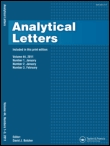
ANALYTICAL LETTERS
Transforming the Landscape of Analytical ChemistryANALYTICAL LETTERS is a reputable journal published by Taylor & Francis Inc, focusing on the dynamic fields of analytical chemistry, biochemistry, and clinical biochemistry. With an ISSN of 0003-2719 and an E-ISSN of 1532-236X, the journal has been a platform for scholarly articles since its inception in 1967, and is set to continue its contribution to the scientific community until 2024. Despite its classification in Q3 across various categories as of 2023, including analytical chemistry and spectroscopy, ANALYTICAL LETTERS maintains a significant impact within its field, evidenced by its moderate rankings within Scopus. This journal serves as a vital resource for researchers and professionals seeking to explore recent advancements in analytical methodologies, instrumentation, and applications, facilitating the dissemination of critical insights in laboratory practices. With access primarily through institutional subscriptions, it remains positioned as a crucial tool for those advancing knowledge and innovation in analytical sciences.

Brazilian Journal of Analytical Chemistry
Empowering Researchers Through Open Access KnowledgeBrazilian Journal of Analytical Chemistry, published by VISAO FOKKA COMMUNICATION AGENCY, serves as a vital platform for those engaged in the field of analytical chemistry, especially within the Latin American context. With an ISSN of 2179-3425 and an E-ISSN of 2179-3433, this journal aims to promote high-quality research and advancements in analytical methodologies, instrumentation, and applications spanning from 2010 to the present. Although it currently holds a Q4 rank in Analytical Chemistry by Scopus and is placed at the 24th percentile, its commitment to open access publishing provides invaluable opportunities for widespread dissemination of knowledge, catering to researchers, professionals, and students alike. The journal's editorial board comprises emerging and established experts aiming to bridge gaps in analytical chemistry research, particularly in a Brazilian and broader South American context. Situated in São Paulo, Brazil, the journal's role in fostering innovation and collaboration in analytical techniques makes it an essential resource for the academic community.
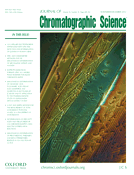
JOURNAL OF CHROMATOGRAPHIC SCIENCE
Exploring the Complexities of Chromatographic ScienceWelcome to the Journal of Chromatographic Science, a premier publication dedicated to advancing the scientific understanding of chromatographic techniques and their applications across various disciplines. Published by Oxford University Press Inc, this journal, with its ISSN 0021-9665 and E-ISSN 1945-239X, has been disseminating innovative research since 1963, serving as a vital resource for researchers, industry professionals, and academic scholars in the fields of Analytical Chemistry and Medicine. As evidenced by its 2023 Scopus ranking, the journal stands at the Q3 quartile in both its primary disciplines, highlighting its relevance and contribution to ongoing research. The journal promotes high-quality, peer-reviewed articles that aim to foster knowledge and encourage the practical application of chromatographic science. While it operates under a traditional subscription model, the valuable insights it offers are essential for those seeking to enhance their expertise and stay at the forefront of chromatographic methodologies. Join our community of scholars as we explore the complexities and innovations in chromatographic science, paving the way for future discoveries.
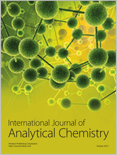
International Journal of Analytical Chemistry
Connecting Researchers to the Future of Analytical ChemistryInternational Journal of Analytical Chemistry, published by HINDAWI LTD, is a leading open access platform that has been advancing the field of analytical chemistry since its inception in 2009. With an ISSN of 1687-8760 and an E-ISSN of 1687-8779, this journal is headquartered in Egypt and serves a global audience, publishing high-quality research and reviews that explore innovative methodologies, techniques, and applications in analytical chemistry. Ranked in the Q3 quartile, the journal holds a notable position within its category, specifically at #90 out of 156 in the Scopus ranks for Analytical Chemistry, showcasing its impact within the scientific community. Researchers, professionals, and students can access a wealth of knowledge freely, as the journal promotes open access to facilitate the dissemination of critical research innovations. By bridging the gap between theoretical advancements and practical applications, the International Journal of Analytical Chemistry continues to play a pivotal role in shaping the future of analytical practices.
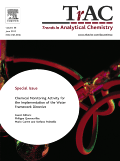
TRAC-TRENDS IN ANALYTICAL CHEMISTRY
Unveiling Trends that Shape the Future of ChemistryTRAC - Trends in Analytical Chemistry is a prestigious journal published by Elsevier Science Ltd, situated in the Netherlands. With an impressive impact factor reflected in its Q1 rankings across three major categories—Analytical Chemistry, Environmental Chemistry, and Spectroscopy—this journal stands at the forefront of disseminating pioneering research and advancements in the field of analytical chemistry. Established in 1981, TRAC provides a comprehensive platform for researchers to share influential studies and insights related to the latest trends, methodologies, and technologies in analytical techniques. Recognized globally, the journal excels in fostering cross-disciplinary dialogue and innovation, making it an indispensable resource for academics, professionals, and students alike. Explore the latest issues to stay abreast of cutting-edge developments that shape the analytical sciences.

JOURNAL OF ANALYTICAL CHEMISTRY
Shaping the Future of Analytical PracticesJOURNAL OF ANALYTICAL CHEMISTRY, published by PLEIADES PUBLISHING INC, stands as a pivotal resource in the field of analytical chemistry, offering an innovative platform for researchers, professionals, and students to advance their knowledge and contribute to the discourse within the discipline. With an ISSN of 1061-9348 and an E-ISSN of 1608-3199, this journal features a focused exploration of analytical methodologies, instrumentation developments, and applications across various domains, contributing to practical and theoretical advancements in the field. Currently ranked in the Q3 category in Analytical Chemistry with a Scopus rank of #111 out of 156, it provides critical insights and innovation strategies for professionals aiming to enhance their analytical capabilities. Access to the journal is through standard subscription models, and it covers an extensive range of topics pertinent to the discipline from 1996 to 2024. Engage with the JOURNAL OF ANALYTICAL CHEMISTRY to be part of a vibrant research community dedicated to push the boundaries of analytical practices.

LCGC North America
Bridging Research and Application in Analytical ChemistryLCGC North America is a pivotal resource in the field of Analytical Chemistry, published by MJH Life Sciences. Since its inception in 1999, the journal has strived to bridge the gap between scientific research and practical applications, catering to a diverse audience that includes researchers, professionals, and students interested in chromatography and related analytical practices. Although currently categorized in the Q4 quartile of Analytical Chemistry, with a Scopus rank of #137 out of 156, LCGC North America is dedicated to delivering insightful articles that foster discussion and innovation within the analytical chemistry community. With a commitment to quality content, the journal covers a broad spectrum of topics, ensuring that readers remain informed about the latest developments and trends in the field. Despite its non-open access model, readers can access its valuable resources through institutional subscriptions and various library networks, making it a vital asset for those engaged in cutting-edge research and practice. Located in Cranbury, NJ, United States, LCGC North America continues to contribute significantly to the advancement of analytical methodologies and technologies.

CHINESE JOURNAL OF ANALYTICAL CHEMISTRY
Connecting Minds in the World of Analytical ChemistryCHINESE JOURNAL OF ANALYTICAL CHEMISTRY, published by SCIENCE PRESS in China, stands as a prominent platform in the field of analytical chemistry since its inception in 1989. With its ISSN 0253-3820 and E-ISSN 1872-2040, the journal maintains a vital role in disseminating empirical research and innovative methodologies, contributing to the advancement of analytical techniques and their applications. The 2023 Scopus ranking positions the journal in the third quartile (Q3) within its category, reflecting a respectable standing among its peers. Researchers, professionals, and students alike engage with a broad range of topics, from instrumental analysis to environmental monitoring, each aiming to foster further scientific inquiry. Although it does not currently offer Open Access, the journal's rich repository of knowledge continues to be an essential resource for those in the analytical chemistry community, with an enduring commitment to scientific excellence and collaboration.
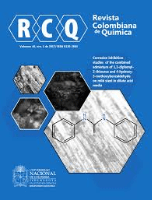
Revista Colombiana de Quimica
Empowering Chemistry through Open Access Knowledge.Revista Colombiana de Quimica, published by the Universidad Nacional de Colombia, Departamento de Química, is a distinguished open access journal that has been serving the chemistry community since 1971. With an ISSN of 0120-2804 and an E-ISSN of 2357-3791, this journal presents a platform for researchers, professionals, and students to share and disseminate their findings in the field of chemical sciences. Positioned in the Q4 quartile in the 2023 rankings, this journal focuses on a diverse spectrum of topics within general chemistry, cultivating a rich discourse among scholars and practitioners in Colombia and beyond. Although the journal currently ranks 294 out of 408 in the field, its commitment to open access research ensures that valuable scientific knowledge is accessible to a wider audience, thus facilitating collaboration and advancement in the chemical sciences. As it converges from 2008 to 2022, the Revista Colombiana de Quimica remains a vital resource for anyone looking to contribute to or stay abreast of developments in chemistry.
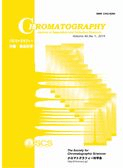
Chromatography
Elevating analytical science through rigorous chromatography studies.Chromatography is an esteemed journal published by the SOC CHROMATOGRAPHIC SCIENCES, dedicated to advancing the field of chromatographic techniques and their applications across various disciplines, including analytical chemistry, biochemistry, and environmental science. By facilitating the exchange of high-quality research, Chromatography plays a pivotal role in enhancing methodologies and technologies that drive innovation in sample analysis. While the journal is not currently open access, it maintains a rigorous peer-review process, ensuring the publication of valuable and impactful studies. Researchers, professionals, and students alike can benefit from its comprehensive coverage of chromatography-related advancements, making it a vital resource for anyone engaged in this dynamic area of study.